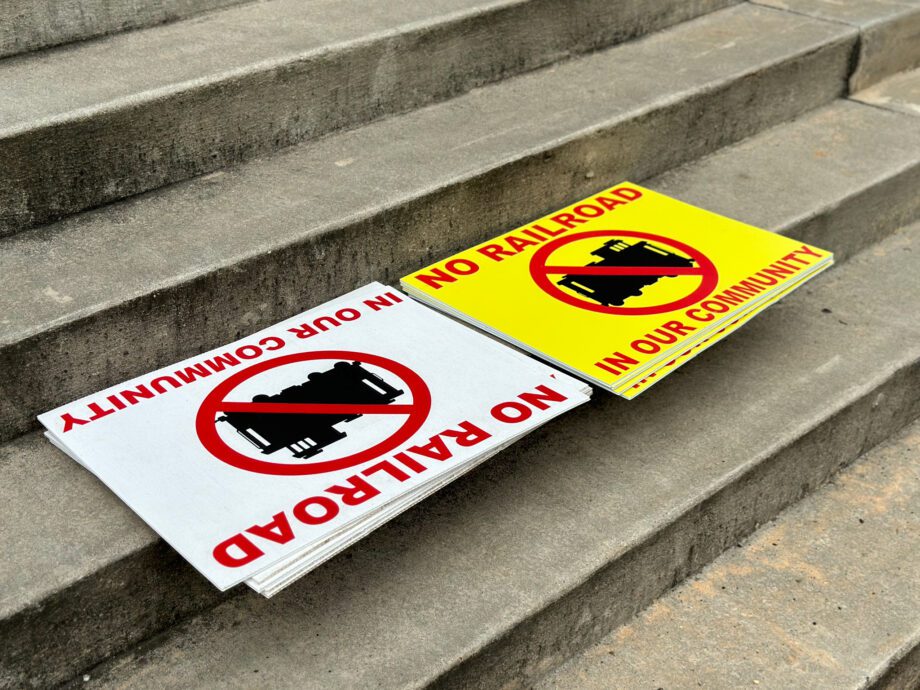Landowners in a predominantly Black town in rural Georgia who have been fighting to keep their properties from falling into the hands of a railroad company were dealt another blow on Wednesday when a state regulatory authority ruled in favor of the railroad.
During a Wednesday session, the Georgia Public Service Commission unanimously approved Sandersville Railroad Co.’s proposed rail spur in Sparta — a project that would cut through the historically Black community. The five-member commission is made up of three white men, Jason Shaw, Tim Echols, and Lauren “Bubba” McDonald. There’s one Black member, Fitz Johnson; and one white woman, Tricia Pridemore.
The commissioners didn’t offer any feedback on their decision during the 11-minute, livestreamed meeting.
Shaw, the chairman of the board, provided the only comment: “I would like to say this has been a long, difficult case, and I want to thank all the parties, and especially thank our staff for the diligence, hard work, and all the parties for just the professionalism and decorum shown on this case.”
Two families — one Black and one white — own the majority of parcels. The decision disappointed the landowners, who were not allowed to speak at the meeting but issued a statement vowing to continue fighting to keep their land by appealing in court.
Blaine Smith, a Black man who is one of the heirs of 600 acres that came into their family in the 1920s, said in a statement: “We’re determined to keep fighting against this attempt to take our ancestral land from us.”
“We want to keep our property whole, so we can pass it down to our children and they can continue to build generational wealth,” Smith added.
The construction would also have an impact on other Black residents in the community, who believe it would affect their quality of life.
The Sparta case is one of dozens involving private companies or governmental entities using eminent domain to take Black land for the sake of economic development. Eminent domain is a centuries-old practice that allows the government to take private land for public use from property owners who are unwilling to sell.
The law provides that property owners receive just compensation. But, some legal experts and landowners told Capital B that Black communities aren’t experiencing “just” and “fair” processes and say there needs to be more accountability to stop government abuse of eminent domain.
“As Black people, ownership of land and property is more valuable than a dollar amount because it allows a certain type of economic freedom that we are often deprived of,” attorney Sharika Robinson told Capital B last year. “I don’t know what is ‘just’ about replacing that economic liberty with a dollar amount that will not increase in value.”
Read More: Why This Rural Community Is at War With a 130-Year Railroad Company
The property owners are represented by the nonprofit Institute for Justice, a public interest law firm.
“Georgia law does not permit a private company to take land through eminent domain unless the land will be put to a public use,” said Bill Maurer, senior attorney for Institute for Justice who represents the landowners. “Building a rail spur that will only be used by a few private companies, and not the public at large, is not a public use. We look forward to making it clear to the court that the [Public Service Commission] made an error in considering Sandersville’s land grab as a public use.”
The railroad project involves constructing a 4.5-mile rail spur to connect the Hanson Quarry, a rock mine owned by Heidelberg Materials, to a main train line along a nearby highway.
Benjamin Tarbutton III, the owner of Sandersville Railroad, has contended this development is expected to create 20 temporary construction jobs, a dozen permanent jobs with an average salary and benefits package of $90,000, and generate over $1.5 million annually for Hancock County.
The battle over the project began last year when several property owners — Black and white — refused to sell parcels of their land to the company, which is located 25 miles away. Other residents told Capital B they feared potential damage to their homes from the train.
There are also environmental concerns, said Jamie Rush, senior staff attorney with the Southern Poverty Law Center’s Economic Justice Project who represents the No Railroad In Our Community Coalition, a coalition of residents who aren’t losing their property to the railroad but will be affected by the train.
“The reality is if you’ve ever lived near a train, or you’ve ever ridden on a train or been near a train, it’s not the same as trucks driving by,” Rush said last year. “Even if the train is not going through your property, the fact that a train is near your property — all of the noise pollution, the vibrations of a train … all of that affects your property value, your peace of mind and your home.”
When landowners refused to sell, the privately owned railroad company, which has been in operation for centuries, sought to acquire the property in March 2023. The company filed a petition using eminent domain with the state’s public service commission to condemn land from 18 parcels of land from owners along Shoals Road.
Read More: Tennessee Wants to Take Land from Black Residents So a Ford Plant Can Benefit
In April, Capital B reported that Thomas K. Bond, a hearing officer with the Georgia Public Service Commission, approved Sandersville’s request to move forward with condemning properties to construct their railroad spur.
“The proposed condemnation … serves a legitimate public purpose and is necessary for the proper accommodation of the business,” Bond wrote. “The petition of Sandersville Railroad, as amended, is granted.”
The Public Service Commission held oral arguments on Aug. 6 from the Sandersville Railroad and attorneys from the Institute for Justice. The landowners spoke at a hearing in November.
Two weeks after the hearing, Georgia state Rep. Spencer Fyre sent a letter to the commission describing the land acquisition as a “heist attempt,” where private businesses are looking to increase their profits by taking folks’ land despite their resistance to sell.
“I truly hate to have to say this, but if David v. Goliath had been decided by the GA Public Service Commission, they’d have confiscated David’s slingshot and handed it to the Philistines,” Fyre wrote.



